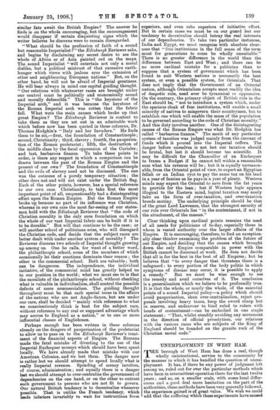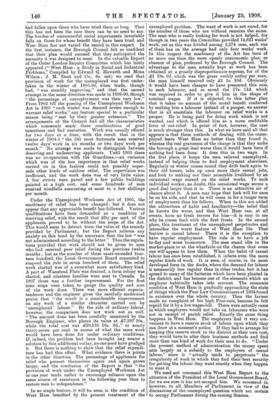UNEMPLOYMENT IN WEST HAM. T HE borough of West Ham has
done a real, though wholly unintentional, service to the community by the manner in which it has handled the question of unem- ployment. It has, if there be any power of judgment left among us, ruled out for ever the particular methods which have been in intermittent operation there for the last twelve years ; and as, on a smaller scale, with some local differ- ences and a good deal more hesitation on the part of the authorities, these methods have been very generally followed. the experience gained is of great value. We wish we could add that the suffering which these experiments have caused had fallen upon those who have tried them so long. That this has not been the case there can be no need to say. The burden of unsuccessful social experiments invariably falls on those for whose benefit they have been tried, and ,West Ham has not varied the record in this respect. In the first instance, the Borough Council felt so confident that their plan would succeed that they anticipated the necessity it was designed to meet. In the valuable Report of the Outer London Inquiry Committee which has lately appeared (" West Ham : a Study in Social and Industrial Problems," Compiled by Edward G. Howarth and Mona Wilson ; J. M. Dent and Co., 6s. net) we read that provision of work for the unemployed was first under- taken in the winter of 1895-96, when trade, though bad, "was steadily improving," and that the second attempt in the same direction was made in 1898-99, though "the percentage of unemployment was then very low." From 1902 till the passing of the Unemployed Workmen Act in 1905 "each winter was deemed severe enough to warrant relief works," any feature special to a particular season being "met by their greater extension." The arrangements of the Council had all the characteristics which commonly mark these combinations of good intentions and bad execution. Work was usually offered for two days at a time, with the result that in the winter of 1904-5 "the 585 most fortunate men received twelve days' work in six months or two days' work per month." No attempt was made to distinguish between deserving and undeserving applicants. Until 1905 there was no co-operation with the Guardians,—an omission .which was of the less importance in that relief works carried on in this fashion could not possibly super- sede other kinds of outdoor relief. The supervision was inefficient, and the work done was of very little value. A few streets were paved and a few public buildings painted at a high cost, and some hundreds of men received windfalls amounting at most to a few shillings per month.
Under the Unemployed Workmen Act of 1905, the machinery of relief has been changed; but it does not appear that any appreciable benefit has followed. Various qualifications have been demanded as a condition of receiving relief, with the result that fifty per cent. of the applicants proved to be without the scope of the Act. This would seem to detract from the value of the remedy provided by Parliament; but the Report relieves any anxiety on this head by the assurance that the law "was not administered according to the letter." Thus the regula- tions provided that work should not be given to men who had received poor relief during the previous twelve months ; but as the number of these cases exceeded four- teen hundred, the Local Government Board consented to suspend the rule in seven hundred of them. The relief work started was of a somewhat more satisfactory kind. A part of Wanstead Flats was drained, a farm colony was started, and nineteen families were sent to Canada. In 1907 there was a further improvement. For the first time steps were taken to gauge the quality and cost of the work done. There was more efficient superin- tendence, and the engineer gives the carefully moderated praise that "the result is a considerable improvement on any work of a similar character carried out by ' unemployed ' labour." By the side of ordinary labour, however, the comparison does not work out so well. "The amount done has been carefully measured by the Borough Engineer, who places its value at £7,397 10s., while the total cost was £10,135 16s. 8d.," or nearly thirty-seven per cent. in excess of what the same work would have been done for under ordinary conditions. If, indeed, the problem had been brought any nearer a solution by this additional outlay, no one need have grudged it. But there is nothing to show that the relief expendi- ture has had this effect. What evidence there is points in the other direction The percentage of applicants for relief who present themselves again and again grows larger, and the conclusion of the Report is that "the provision of work under the Unemployed Workmen Act in one year tends rather to encourage reliance upon the same source of assistance in the following year than to restore men to independence."
In no single feature, it will be seen, is the condition of West Ham benefited by the present treatment of the unemployed problem. The want of work is not cured, for the number of those who are without remains the same. The man who is really looking for work is not helped, for though in two years the Committee provided 14,821 weeks' work, yet as this was divided among 3,274 men, each one of them has on the average had only four weeks' work. In this respect the machinery of the Act has been of no more use than the more openly uneconomic plan, or absence of plan, preferred by the Borough Council. The advantage to the men actually kept at work has been obtained at a greatly disproportionate expense, for of the .21 19s. 9d. which was the gross weekly outlay per man, the man himself received only £1 is. 10d. Obviously it would have been cheaper to have presented this sum to each labourer, and so saved the 17s. 11d, which was required in order to give it him in the shape of nominal wages. If it is objected to this latter plan that it takes no account of the moral benefit conferred by making him a labourer instead of a pauper, we answer that in all essentials the labourer on relief works is a pauper. He is being paid for doing work which is not wanted, and which is offered him as a more creditable form of out-relief. In point of fact, however, the case is much stronger than this. In what we have said all that appears is that these methods of dealing with the unem- ployed leave West Ham no better than they found it, whereas the real gravamen of the charge is that they make the borough a great deal worse than it would have been if nothing had been done. It does this in two ways. In the first place, it keeps the men relieved unemployed, instead of helping them to find, employment elsewhere. Regularly as winter comes round they drift back again to their old homes, take up once more their casual jobs, and look to making out their miserable livelihood by an occasional wage earned on the relief works. To each individual worker, no doubt, this occasional wage seems a good deal larger than it is. There is an attractive air of chance about it. A man may hope that luck will for once be on his side, and that he will come in for a longer term of employment than his fellows. When to this are added the attractions of habit and familiarity—the belief that he knows the worst, and that West Ham can, at all events, have no fresh terrors for him—it is easy to see why he comes back with the first frosts. In the second place, this treatment of the unemployed perpetuates and intensifies the worst feature of West Ham life. That feature is casual labour. There it is the exception to have regular employment. The rule is to have a job to-day and none to-morrow. The men stand idle in the market-place or at the wharfside on the chance that some one will appear to hire them. When the habit of casual labour has once been established, it infects even the more regular kinds of work. It is seen, of course, in its most developed form in the docks, where the demand for labour is necessarily less regular than in other trades, but it has spread to many of the factories which have been planted in the district, and has become one of the elements which an employer habitually takes into account. The economic condition of West Ham is gradually approaching the state of things which the Poor Law Commissioners of 1834 found in existence over the whole country. Then the farmer made no complaint of his high Poor-rate, because he felt repaid for it by a low wages-bill. There were actually cases in which employers would not take on labourers who were not in receipt of parish relief. Exactly the same thing happens in West Ham. The employers find it very con- venient to have a reserve stock of labour upon which they can draw at a moment's notice. If they, had to arrange for keeping this reserve stock in the district at their own cost, they would have to alter their business methods and find more than one kind of work for their men to do. "Under the present method of administration the money spent acts largely as a subsidy to the employers of casual labour," since it "actually tends to perpetuate" the irregularity of work in which they find their best security for getting the labour they want exactly when they happen to want it.
We need not commend this West Ham Report to the attention of the President of the Local Government Board, for we are sure it has not escaped him. We commend it, however, to all Members of Parliament in view of the discussions of the unemployed question which are certain to occupy Parliament during the coming Session.





















































 Previous page
Previous page